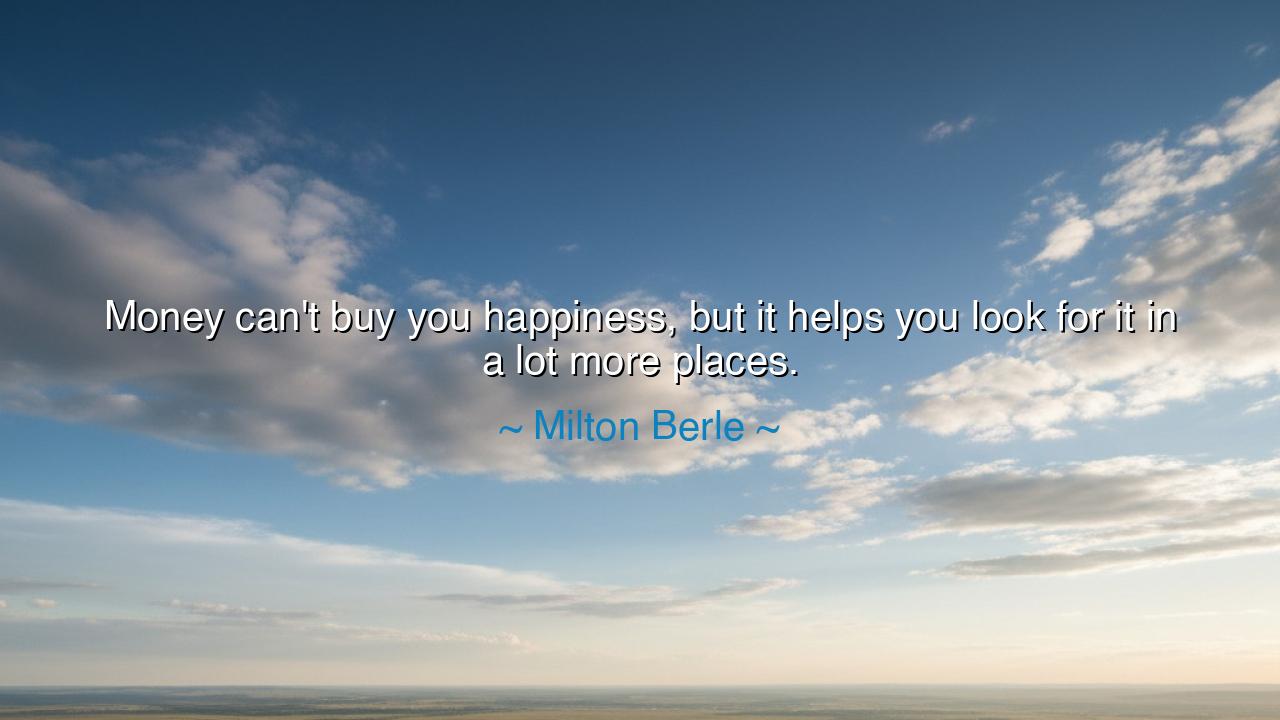
Money can't buy you happiness, but it helps you look for it in a






In the words of Milton Berle, “Money can’t buy you happiness, but it helps you look for it in a lot more places,” we hear a saying that is at once humorous and wise, light-hearted yet profound. Though spoken by a man known for his wit and laughter, the meaning behind these words reaches beyond comedy — it is a reflection on the human pursuit of happiness and the complex role that money plays in our search for it. Berle, a master of blending truth with jest, reminds us that wealth may open doors and broaden horizons, but it cannot fill the emptiness of the soul. Yet, he also concedes, with the practical wisdom of one who has lived much, that money can ease the path toward joy — it gives freedom, choice, and opportunity, though never peace of heart.
The origin of this quote rests in the life and times of Milton Berle himself, a titan of early television and comedy, often called “Mr. Television.” He lived in an age when America was awakening to material abundance, when success was increasingly measured by possessions and fame. But Berle had seen both sides of fortune — the glamour of wealth and the loneliness that can dwell beneath it. His words carry the dual tone of irony and truth: a jest at our endless chase for satisfaction through things, and a nod to the reality that money, while not the source of happiness, can grant access to the circumstances where joy may be discovered.
To the ancients, this truth was well known, though spoken in different words. The philosopher Epicurus taught that happiness comes not from wealth itself, but from the wise use of it — from the simple pleasures that money may enable, not from its endless accumulation. Seneca, the Stoic, wrote that “wealth consists not in having great possessions, but in having few wants.” Yet he also recognized that fortune can grant the means to serve, to learn, to travel, to grow — things which, when used rightly, can nurture contentment. Thus, Berle’s wry statement carries within it an ancient echo: that money is neither the enemy nor the savior of the soul, but a tool — dangerous to the fool, useful to the wise.
Consider the story of Andrew Carnegie, the steel magnate who rose from poverty to immense wealth. In his youth, Carnegie believed that riches would bring him happiness, but when he achieved them, he found emptiness instead. It was only when he turned his fortune toward purpose — building libraries, funding education, giving to those in need — that he found meaning. His wealth did not buy happiness, but it allowed him to seek it in more places: in generosity, in legacy, in service. Thus, his life stands as living proof of Berle’s paradox — that money can expand the field of opportunity, but only wisdom and virtue can plant joy within it.
Yet there is danger hidden in Berle’s jest. For many, the endless search for happiness through wealth becomes a mirage — the more they possess, the further joy seems to retreat. To look “in more places” can become a curse if one forgets that happiness is not a thing to be found, but a state to be cultivated. The world’s richest men have often confessed their restlessness; their palaces and pleasures brought comfort but not peace. For as the old proverb says, “You cannot fill a bottomless heart with gold.” Money can make the journey easier, but it cannot show you the destination.
Still, Berle’s wisdom is not cynicism — it is balance. He does not scorn money, nor worship it. He merely reminds us that wealth, properly understood, is a servant and not a master. It can buy comfort, but not contentment; adventure, but not purpose; company, but not love. The wise use it as a bridge toward the experiences that enrich the spirit, not as the foundation upon which they build their worth. In this way, his humor conceals a serious teaching: that happiness begins not with what you own, but with how you think, act, and give.
Let this be the lesson for all who hear: do not despise wealth, nor be enslaved by it. Use what you have — much or little — to explore life, to serve others, to learn, to love. Let money be a tool in your hands, not a chain around your heart. Seek joy not in possession, but in participation — in the act of living fully, gratefully, and wisely. For as Milton Berle reminds us with a smile and a truth, though money may not buy happiness, it can help you wander farther along the road where happiness may be waiting — if only you have the eyes to see it when you arrive.






AAdministratorAdministrator
Welcome, honored guests. Please leave a comment, we will respond soon